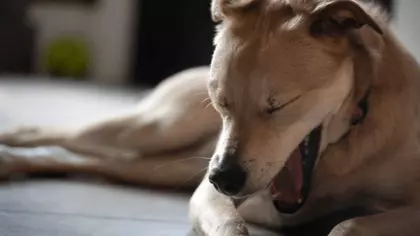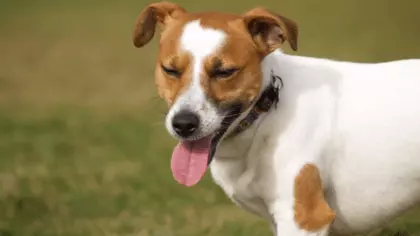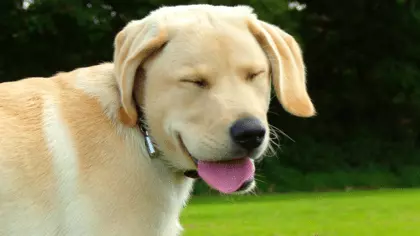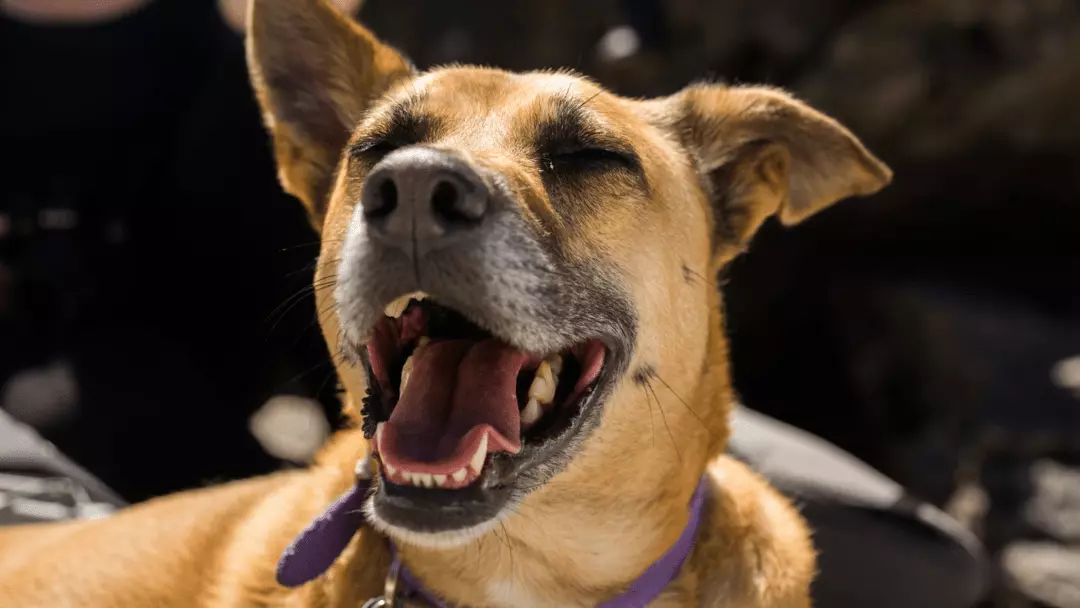Are you more afraid of your dog’s sneezing than enjoying the cute-looking eyes and noses during this act? Wondering why does my dog sneeze in my face? Dogs sneeze mostly to communicate, show love and affection, and ask to play, or have allergies. However, it can be the result of some serious health issues.
Read on, to briefly understand the reason for your dog’s sneeze, when to be worried, and tips to prevent it if it annoys you.
Why does My Dog Sneeze in My Face?

Just like a human, the dog may also sneeze for plenty of reasons. So it can be either irritating in your dog’s nose or more serious issues. So let’s look at some reasons why your dog sneezes in your face.
Affection
Your furry friend loves you and wants to be close to you all the time, even when their sneeze comes on. They don’t understand that you don’t like their snot droplets in your face. Your dog may also seek you out when feeling this tickle, believing that you are the rescuer.
Some pet parents also ask why does my dog sneeze on them on purpose. If your dog is on you on purpose, it means she is having fun by sneezing and showing her excitement. Playing sneeze is also an indication of playful behavior.
Time to Play
As mentioned, sneezing can also be part of a playful act. Your dog may ask you to play by sneezing in your face. Some active and energetic dogs start to rock and roll right after opening their eyes in the morning. Some dogs also sneeze when their owner kisses them to show their willingness to play. Another strange behavior of the dog is that they sneeze when playing and fighting, which also an indication of playing sneezing.
Happiness
Do dogs sneeze when they are happy? Yes. A dog can sneeze excessively when greeting the owner or getting treats or toys. Sneezing during play is also an indication that your dog is having fun. During rough play, dogs indicate that they don’t mean to harm you and don’t want to start fighting.
So don’t take this sneezing as a symptom of illness or an allergy. Proper sneezing comes from the deep chest and discharges saliva or mucus.
Allergies
Does your dog sneeze excessively? Allergies can be the main issue. Apart from sneezing, a dog with respiratory infections or allergies should also show other signs like red and itchy eyes, a runny nose, colored nasal discharge, or a cough. So if your dog sneezes continuously in your face, you should give the house a good cleaning.
Monitor your dog carefully and look for grass, molds, and plants to which your dog may react. With the approval of a vet, you can also give Benadryl to your dog. If the dog keeps sneezing, take him to the veterinarian to eliminate the cause. Food allergies and household product allergies are two of the most common types of allergies.
Communicate
Another potential reason why does your dog sneeze in your face is to communicate with you and want to tell you that she likes you. So it can be a simple communication method like facial expressions or body language.
Dogs also communicate through sneezing during play. Dogs now sneeze as a signal of calmness, indicating that they want you to take a break, slow down, or express comfort.
Environmental Irritants
If an environmental irritant is stuck in your dog’s nose, she can start sneezing. It is especially true for a dog that digs in the dirt or sticks its snout in the grass frequently. This can cause grass blades to become lodged in their nasal cavity, resulting in sneezing.
Pollen or aerosols can also cause environmental irritants in your dog, resulting in sneezing on your face.
Your dog may also sneeze due to dust or dislike of your odor. Some dogs don’t feel comfortable with strong smells like cologne, cleaners, or chemicals. Dogs also create reverse sneezing due to irritants in the nasal cavity.
Infections
If your pooch sneezes in your face and has other medical conditions like fungal infections or kennel cough, it means the infection is the root of the sneezing. In this case, your dog may show other symptoms like nasal discharges, watery eyes, sneezing with pain, pawing frequently at the nose, or bleeding from the nose. Take your furry friend to the vet after noticing either of these signs.
If your dog sneezes deeply from the lung, she may have nasal mites, which are small parasites that primarily affect large-breed dogs. The symptoms of nasal mites are facial itching, labored breathing, nasal discharge, head shaking, nose bleeds, reverse sneezing, and noisy breathing, as well as deep sneezing in your face.
When should you be Concerned about Your Dog’s Sneeze?

Your dog should be seen by a professional if they sneeze frequently, experience nasal discharge, or feel pain while sneezing. In addition, monitor your pooch carefully for unusual behavior like frequent pawing at the nose or bleeding along with continuous sneezing.
Continuous sneezing can also be caused by something obstructing their nasal passage that should be checked by a vet. It’s particularly true for hunting dogs. Because they are constantly exploring the outdoors, they are prone to getting unwanted objects stuck in their snout. Hence, you should examine the snout regularly in case outdoor fragments get stuck inside.
If your dog sneezes deeply from the chest, it can be a symptom of a medical condition like a nasal infection, a cold, or nasal mites. Though sneezing is normal in most cases, don’t hesitate to talk to a vet, particularly if you notice any of these signs:
- Difficulty breathing
- Noisy breathing
- Fever
- Vomiting
- Lethargy
- Weight loss
- Diarrhea
- Nose bleeds
- Persistent pawing at the nose
- Persistent cough
- Yellow or green nasal discharge
- Excessive sneezing
Either of these signs indicates serious conditions, and a vet should diagnose your pooch so he can treat it accordingly.
How to Prevent Your Dog from Sneezing?

Truthfully, sneezing is a normal dog reaction that can be impossible to stop completely. If your dog sneezes sometimes, it’s a reaction to irritation in the nose.
In this case, you can vacuum your dog regularly and avoid spraying hairspray or deodorant in the same room as your pooch to reduce the risk of irritation and excessive sneezing. Small particles in the air can irritate your dog’s nose, and opening the room’s windows to increase ventilation can help prevent it.
You should also check the dog regularly, particularly after spending a long time on grass, and make sure it’s free of foxtail or grass seed if stuck. But if your dog sneezes excessively and shows other signs like bleeding or wheezing, it’s best to let a vet examine your pooch to find the underlying issue and treat it. It is also a good idea to check up on your pet regularly with the vet to avoid causing any serious issues.
FAQs
1. Why does my dog sneeze on me in the morning?
If your dog sneezes in the morning, he or she may have been exposed to allergens during the night. It can happen for a variety of reasons, including sleeping near a dusty floor or ground, which causes dust allergies.
2. Can you get rabies from a dog sneeze?
No, the dog’s sneeze won’t cause rabies. Rabies is not spread through droplets or through the air. So, if your dog sneezes in your face, you don’t have to worry about catching rabies. The virus must enter the body to be transmitted, most commonly through a bite. The other reasons for transmitting the rabies virus are exposure to waste products and contact with wounds and mucous membranes.
3. Why does my dog sneeze when I pet him?
If your dog sneezes while you pet him, it means she is appreciating your behavior. Dogs enjoy their owner’s care and contact, and their responses keep the owner going. They also communicate through sneezing and want to tell you that they like you.
Final Words
The dog, as a domestic pet, exhibits many human-like behaviors, including sneezing. In most cases, dogs’ sneezing is only a way of expressing love, emotion, and affection and not a health issue. However, you shouldn’t ignore any of your dog’s behavior if it goes beyond the normal stage. So if your dog sneezes in your face excessively and frequently, monitors its daily activities and consult with a vet to remain relaxed and enjoy the love of your lovable pet.
